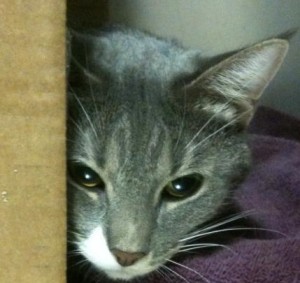 Inflammatory bowel disease is the most common cause of chronic vomiting and diarrhea in the cat. Cats may also have intermittent soft stools or blood and mucous in their stool. Inflammatory bowel disease can affect cats of any age, breed and sex. Cats with inflammatory bowel disease may have a history of vomiting (more than a few times a year). Many cat owners erroneously think this is a normal occurrence. Thinking the cat may be eating too fast or vomiting hairballs.
Inflammatory bowel disease is the most common cause of chronic vomiting and diarrhea in the cat. Cats may also have intermittent soft stools or blood and mucous in their stool. Inflammatory bowel disease can affect cats of any age, breed and sex. Cats with inflammatory bowel disease may have a history of vomiting (more than a few times a year). Many cat owners erroneously think this is a normal occurrence. Thinking the cat may be eating too fast or vomiting hairballs.
Inflammatory bowel disease is a relatively common problem for cats. It may only involve the small intestine, large intestine, and the stomach, or in some cases all parts of the gastrointestinal tract including the mouth.
Cats with inflammatory bowel disease may show other symptoms. These can be as subtle as simply “not acting like themselves”. Your cat may not eat as much or be a bit lethargic. Inflammatory bowel disease causes abnormal function of the intestinal tract resulting in excessive amounts of gas production. This can lead to abdominal discomfort. Inflammatory bowel disease also causes cramping and smooth muscle spasms. Some cats will sit hunched up, some become abnormally quiet and some will even lick the fur off their belly to try and relieve the pain – poor kitties.
At this point no one knows exactly what causes inflammatory bowel disease in the cat. The research community has determined that inflammatory bowel disease is an immune system over reaction (hypersensitivity). In cats with inflammatory bowel disease the immune system incorrectly over reacts to things in the intestinal tract. Bacteria, food, parasites and toxins all may cause an over-reaction in a cat with inflammatory bowels disease.
The successful diagnosis of inflammatory bowel disease first requires all other causes of intestinal inflammation be ruled out. Your veterinarian may recommend blood work, radiographs, ultrasound, stool cultures, pancreatic tests and finally biopsies. This is not a disease you want to mis-diagnose as your cat may become sicker or the wrong medication suggested.
After a positive diagnosis of inflammatory bowel disease, treatment will begin. Sometimes a change in diet may help a cat with inflammatory bowel disease. Often a cat with inflammatory bowel disease will also need supplementation with potassium or b vitamins as their intestines do not absorb nutrients properly.
If dietary changes do not help the cat’s inflammatory bowel disease then medications are often used. These medications help to prevent the inflammatory response in the cat’s body. Medications such as Metronidazole or Prednisolone work well. These medications have the potential for side-effects and do need to be monitored with blood work and an examination every few months.
Normally inflammatory bowel disease is controlled successfully. Biopsies help determine how severe the disease is and what the prognosis will be. Cats with inflammatory bowel disease are more likely to develop other medical problems, especially if the inflammatory bowel disease is not being controlled properly. The most common problems are diabetes, intestinal cancer, kidney disease, liver disease and pancreatic problems. These are all reasons to carefully monitor your cat’s health with annual to semi-annual yearly examinations and blood work.
If you would like to schedule an appointment for your cat click here : http://northernilcatcliniccom.web.siteprotect.net/schedule-appointment/